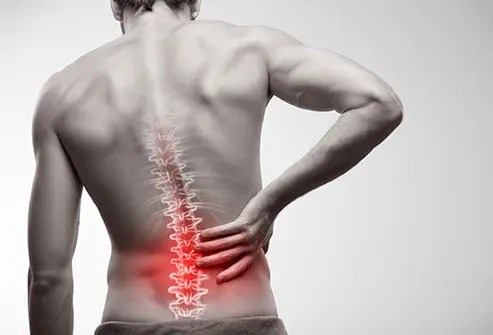
Waist pain is a common complaint among men, especially as they age or engage in physically demanding work or activities. While occasional discomfort might not be a cause for concern, persistent waist pain could be a sign of an underlying issue that shouldn’t be ignored.
1. Muscle Strain or Overuse
Cause:
Lifting heavy objects, strenuous exercise, poor posture, or sudden movements can strain the muscles in the lower back and waist area….CONTINUE FULL READING>>>>>
Symptoms:
- Dull, aching pain in the lower back or waist
- Stiffness, especially in the morning
- Pain that worsens with movement
Solution:
2. Kidney Problems
Cause:
Conditions like kidney stones or kidney infections (pyelonephritis) can cause pain that radiates to the waist or lower back.
Symptoms:
- Sharp or cramping pain on one side of the waist
- Pain that comes in waves (in the case of kidney stones)
- Fever, chills, nausea, and painful urination (for infections)
Solution:
Immediate medical evaluation is required. Treatment may involve antibiotics for infections or procedures to remove kidney stones.
3. Prostate Issues
Cause:
An enlarged prostate or prostatitis (inflammation of the prostate gland) can cause discomfort around the lower abdomen and waist area.
Symptoms:
- Dull pain in the waist, groin, or lower back
- Frequent urination, especially at night
- Painful urination or difficulty starting urine flow
Solution:
Consult a doctor. Treatment may include medications or lifestyle changes, depending on the condition.
4. Herniated or Bulging Disc
Cause:
A slipped or herniated disc occurs when the cushioning between spinal bones is damaged, pressing on nearby nerves.
Symptoms:
- Sharp or burning waist and lower back pain
- Pain that radiates down the leg (sciatica)
- Numbness or tingling
Solution:
Physical therapy, medication, or in some cases, surgery may be necessary. Early intervention improves recovery chances.
5. Arthritis or Degenerative Joint Disease
Cause:
Osteoarthritis or other forms of joint degeneration can affect the spine and cause chronic waist or lower back pain.
Symptoms:
- Stiffness and pain, especially after rest
- Gradual worsening of symptoms over time
- Limited mobility
Solution:
Pain management, physiotherapy, anti-inflammatory medications, and weight management are often recommended.
6. Poor Posture or Sedentary Lifestyle
Cause:
Sitting for long hours, especially with poor posture, can weaken the muscles supporting the waist and spine.
Symptoms:
- Dull, aching pain that worsens with prolonged sitting
- Mild stiffness and discomfort
- Improvement after stretching or walking
Solution:
Encourage regular movement, back support chairs, and exercises to strengthen core muscles.
7. Pelvic or Abdominal Conditions
Cause:
Sometimes waist pain can be referred pain from conditions affecting the digestive system or reproductive organs.
Symptoms:
- Abdominal cramps or bloating
- Unusual bowel or urinary symptoms
- Pain that moves between waist, abdomen, or pelvis
Solution:
A thorough medical examination is needed to rule out issues like hernias, infections, or gastrointestinal problems.
When to See a Doctor
Encourage your man to seek medical help if:
- The pain lasts more than a few weeks
- It interferes with daily activities or sleep
- It’s accompanied by fever, weight loss, or numbness
- Over-the-counter treatments don’t provide relief
Final Thoughts
Persistent waist pain in men can stem from something as simple as a muscle strain or as serious as kidney disease or spinal issues. Ignoring the pain or constantly masking it with painkillers can delay proper treatment and worsen the condition.
Encourage him to listen to his body, seek help when needed, and adopt healthy habits like exercise, stretching, hydration, and proper posture. A pain-free waist means a more active and happier life.CONTINUE FULL READING>>>>>
